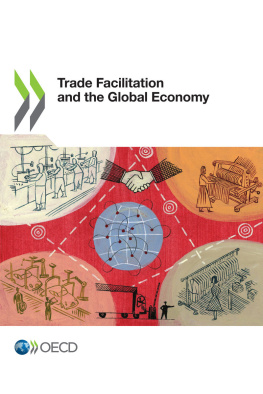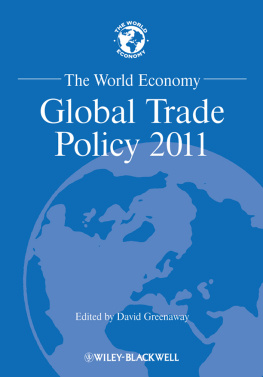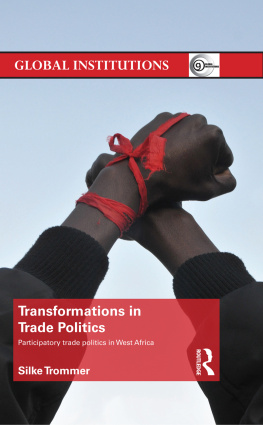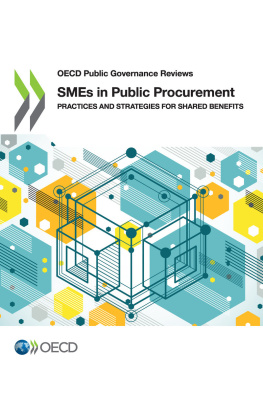coll. - Trade Facilitation and the Global Economy
Here you can read online coll. - Trade Facilitation and the Global Economy full text of the book (entire story) in english for free. Download pdf and epub, get meaning, cover and reviews about this ebook. City: Paris, year: 2018, publisher: Organization for Economic Cooperation and Development, genre: Politics. Description of the work, (preface) as well as reviews are available. Best literature library LitArk.com created for fans of good reading and offers a wide selection of genres:
Romance novel
Science fiction
Adventure
Detective
Science
History
Home and family
Prose
Art
Politics
Computer
Non-fiction
Religion
Business
Children
Humor
Choose a favorite category and find really read worthwhile books. Enjoy immersion in the world of imagination, feel the emotions of the characters or learn something new for yourself, make an fascinating discovery.
Trade Facilitation and the Global Economy: summary, description and annotation
We offer to read an annotation, description, summary or preface (depends on what the author of the book "Trade Facilitation and the Global Economy" wrote himself). If you haven't found the necessary information about the book — write in the comments, we will try to find it.
Trade Facilitation and the Global Economy — read online for free the complete book (whole text) full work
Below is the text of the book, divided by pages. System saving the place of the last page read, allows you to conveniently read the book "Trade Facilitation and the Global Economy" online for free, without having to search again every time where you left off. Put a bookmark, and you can go to the page where you finished reading at any time.
Font size:
Interval:
Bookmark:
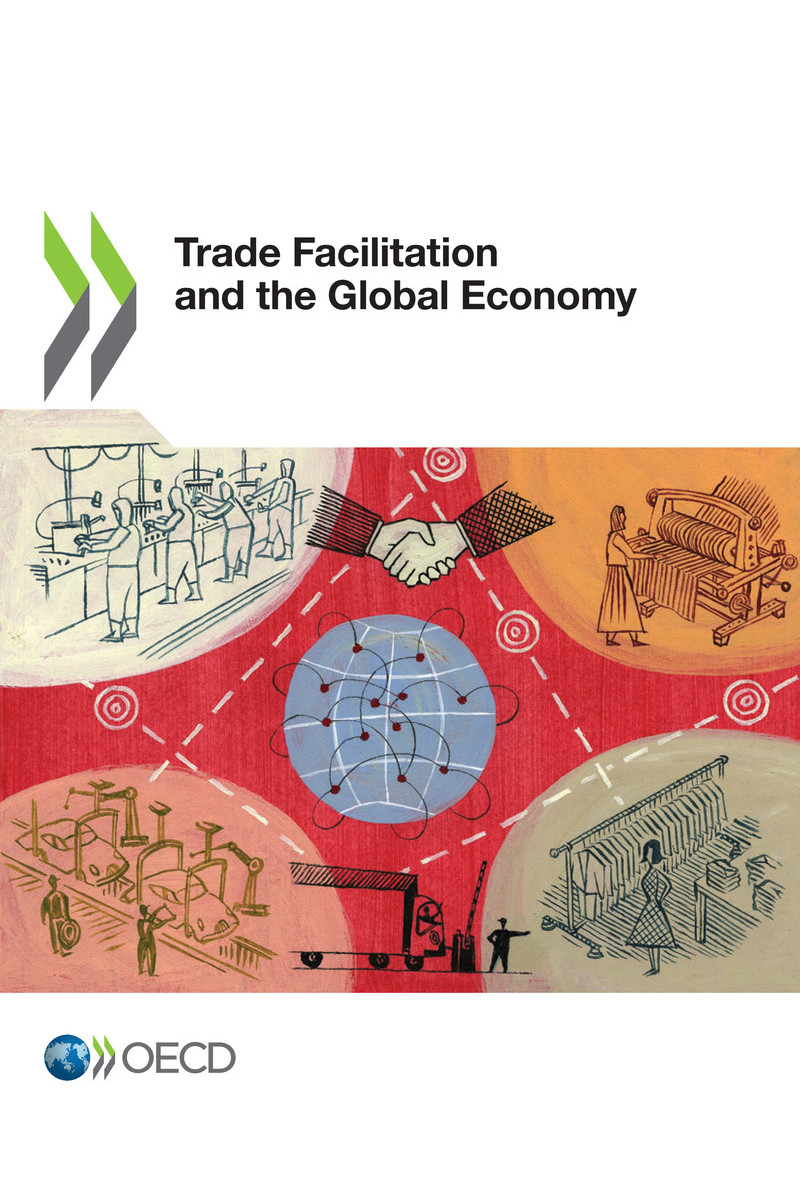
OECD (2018), Trade Facilitation and the Global Economy , OECD Publishing, Paris.
http://dx.doi.org/10.1787/9789264277571-en
Trade facilitation transparent, predictable and straightforward border procedures that expedite the movement of goods promises large gains domestically and globally. In a globalised world, where production is spread across countries and goods cross borders many times before reaching consumers, trade facilitation is essential to lowering trade costs and increasing economic welfare. Efficient border procedures allow firms to reduce losses of perishables, cut inventory costs, be more responsive to changing consumer preferences, and participate in time-sensitive global value chains. The OECD Trade Facilitation Indicators (TFIs) provide a powerful tool to assess these gains and to monitor worldwide efforts to improve border procedures, reduce trade costs, boost trade flows, and contribute to inclusive growth. They are the most precisely targeted instrument for monitoring and benchmarking country performance on trade facilitation across more than 160 countries.
The TFIs show that implementation of the WTO Trade Facilitation Agreement (TFA) is well underway, but progress is uneven and some significant challenges remain, in particular regarding domestic and cross-border agency co-operation. Technical and financial assistance is playing an important role in enabling implementation. The TFA is expected to reduce trade costs between 12% and 18%, and to increase world trade. Developing and emerging economies are likely to benefit the most from reduced import and export costs and faster delivery times, leading to efficient participation in time-sensitive global value chains.
Beyond the obvious effects on trade and production, trade facilitation is critical for inclusiveness. Lowering trade costs is disproportionately more significant for small firms, increasing opportunities for start-ups generally and for female entrepreneurs in particular to move from the informal to formal economy, and to grow their businesses. Implementing the TFA also contributes to reducing opportunities for illicit trade, bribery, and corruption that stifle entrepreunership. The importance of trade facilitation in removing layers of additional costs becomes even more important in the digital era, with growing numbers of parcels crossing international borders, both raising demand and creating new challenges for government controls and facilitation.
The TFA, and its early success, represent a promising approach for future multilateral trade reform, providing flexibilities for adjusting implementation in line with country capacities, underpinned by technical and, where necessary, financial support. In brief, the TFA is a compelling example of effective international co-operation.

Ken Ash, Director
OECD Trade and Agriculture Directorate
The work that this book draws on was prepared under the aegis of the OECD Trade Committee and its Working Party. Countries covered in the Trade Facilitation Indicators (TFI) database contributed significantly through their verification of the data and by discussions of the underlying work synthesised in this book. The assistance of the express and logistics industries in providing factual information on implementation of trade facilitation on the ground is gratefully acknowledged. The assistance of the Costa Rican and Swiss authorities in exploring success factors and challenges of border agency cooperation is gratefully acknowleged. The assistance of the Inter-American Development Bank, the Inter-American Network of International Trade Single Windows, the Asia-Pacific Economic Cooperation Forum and the US-ASEAN Connectivity through Trade and Investment in exploring success factors and challenges of Single Windows is gratefully acknowleged.
The book was prepared by Evdokia Moise, Silvia Sorescu, Dorothee Flaig, Emanuele Mazzini, Tom Butterly, Florian Le Bris and Clarisse Legendre, under the supervision of Julia Nielson. Jackie Maher provided assistance in formatting the book and Michle Patterson supervised the publication process. The authors would like to thank Ken Ash, Carmel Cahill, Steve Pope and Cezary Sowinski for useful comments and suggestions.
Trade facilitation transparent, predictable and straightforward border procedures that expedite the movement of goods across borders is becoming ever more important in an increasingly interconnected global economy. In a globalised world, where production is spread across countries and goods cross borders many times before reaching consumers, trade facilitation is essential for lowering the costs of trade. Keeping the costs of trading low is an important part of making trade work for all: trade facilitation helps more and smaller firms to participate in trade and more consumers to benefit from lower prices, higher quality and a greater range of goods.
Successive rounds of multilateral trade negotiations have progressively reduced traditional trade barriers, shifting attention to less visible, but often equally costly, measures at and behind the border: these include the procedures, paperwork, and administrative formalities that can add layers of sometimes unnecessary additional costs to goods as they cross borders. Addressing unnecessary costs related to these procedures is essential for firms to be able to take full advantage of new market openings. This is especially the case for micro-, small- and medium-sized enterprises (MSMEs) for whom the costs of trading can be disproportionately large.
Font size:
Interval:
Bookmark:
Similar books «Trade Facilitation and the Global Economy»
Look at similar books to Trade Facilitation and the Global Economy. We have selected literature similar in name and meaning in the hope of providing readers with more options to find new, interesting, not yet read works.
Discussion, reviews of the book Trade Facilitation and the Global Economy and just readers' own opinions. Leave your comments, write what you think about the work, its meaning or the main characters. Specify what exactly you liked and what you didn't like, and why you think so.

